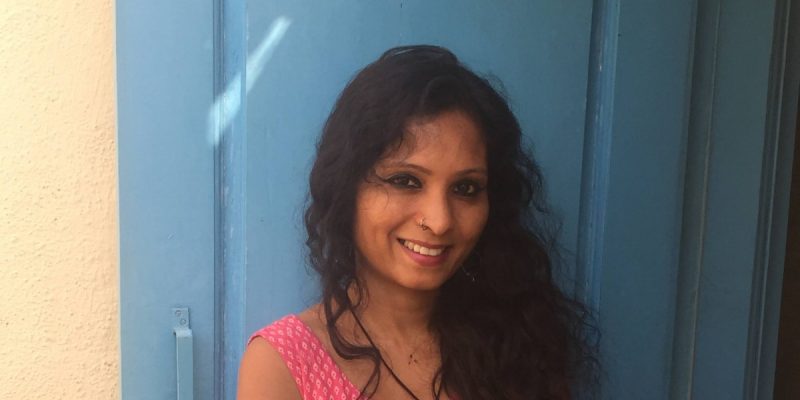What is the identity of a sex worker in India? Is it a forbidden territory in a democratic society? Author, journalist and social sector documentarian Nirmala Govindarajan’s latest book Taboo, published by Pan Macmillan India, is an outcome of years of research and interaction with girls who are kidnapped and trafficked. Govindarajan’s debut novel Hunger’s Daughters (2018) was inspired by a similar haunting experience of documenting the stories of young women breadwinners living in rural areas of Odisha, Jharkhand and Karnataka.
In an exclusive interaction with Khabri Baba, the author foregrounds the struggle and stories of resilient and subversive women in sex trade, laments the sheer apathy and hypocrisy of those in power, presents the urgent need to redefine prescribed meanings of ‘taboo’ and ‘freedom’ in the age of the Citizenship (Amendment) Act and National Register of Citizens, and more.
Edited excerpts:
One of the most striking things about your latest book – Taboo – is how it attempts to dissect the multiple layers of what it means to be ‘independent’ and ‘free’. In the book, you have used the term ‘unfreedom’. How did you make your characters unravel the mysteries and complexities of these two absolutes – ‘independence (in dependence)’ and ‘freedom’?
I first met these girls in Ooty, while I was visiting my friend Catherine (Cathy) Raja – they had been rescued from brothels, and rehabilitated at Freedom Firm, where my friend worked. Many of these young women were HIV+ – they had been abducted when they were still children, and sold to brothels, but all, contending with the freedom they had found from their bonded unfreedom.
And this tussle between freedom and independence was especially striking in one of the girls – Sharda* – here she was, lissome, gorgeous, and intelligent. As a workshop manager of the fashion jewellery making unit at Freedom Firm, she yearned for a richer life, and so, she began seeing men again. When I visited Freedom Firm’s jewellery making workshop – Ruhamah Designs – in Kolkata, I met Sayontika*. As soon as she eased up to me, the 22-year-old gave me her wedding invite – she was marrying the love of her life. She had found the freedom to love, and to live.
Taboo is lyrical in its execution, as was your previous book, Hunger’s Daughters. Is the poetics of rhyme and meter that inform and shape your novel writing deliberate?
Skimming through my most treasured belongings of books and paper preserved in an aluminium school box, my earliest writings are penned in a brown diary. There are poems about everything – ranging from my grandfather to the man in a van, Chippy and Pickmunks – the two squirrels, and being alone and desolate; also a language I was trying to invent, and which, for some strange reason, I chose to call Vespa Perato…all written through my school years, between the age of 8 and 14.
Over time, and after having journeyed through my novels, I realised that my most intrinsic form of expression is a tapestry of sounds and visuals playing out in my head, enveloping my being, translating on paper in a rhythmic, poetic stylistic that comes to me spontaneously. So, when I hear theatre artists reading my writing aloud, and even when I do so myself, I relive the visuals and sounds that have lent context to the narrative.
My writing, a stream of conscious confluence of rhyme, meter and the theatrics of existence, stems from spontaneous emotional responses to life around, and especially that which speaks to me deeply, grabs me in the gut, and seeks an outlet to make this world a better place. Taboo, as with Hunger’s Daughters, is rooted in the hearts of the shaken, stirred and yet strongly feminine. The feminine itself, an incarnation of rhyme and meter.
Also read: Photo Essay: ‘Yes, I Sell My Body’
In the book, there’s a significant scene where The Lady with the Slender Hands says, “Every single resident upon this Footpath has an identity, but it is disputable…Every single Footpath resident’s identity is disputable for lack of a legal document as prescribed by the Consolidated Constitution of the Indian Subcontinent.”
Now, this is reminiscent of what is happening in the country today with specific reference to the protests against the CAA and NRC. Did you always intend the voice of the prostitute to take centre stage in terms of her political expression or was this an afterthought looking at the current socio-political situation of the country?
The stark divide between the ‘haves’ and the ‘have-nots’ in India is not new. The starker divide between the existing identities and adapted identities is real even as the ‘have-nots’ migrate to the so-called havens of opportunity, the cities, and strive to make a living, because, thanks to greedy industrialists and people in power, their lands are at stake, and so are their identities.
My earliest memories of people on footpaths are from my childhood years in Madras, where people did not have enough clothes to cover their bodies, let alone their identity proofs. Across the country, I have come face-to-face with people who don’t know where their next meal is coming from. I wrote Taboo (published in December 2019) in 2015, and the text remains unchanged. But the traumas of identity and the crises of survival are stark. Under such circumstances, one can well imagine the plight of an underage girl who has been kidnapped, trafficked, her identity in shards, now scorned by the same society that seeks to define who belongs and who doesn’t.
The Roadside Romeos and the Suitable Somebodies, Ministers for Shelters and Sanyasi Saloli are treading the same Footpath – this ‘Footpath’ could be interpreted as the ultimate leveller, where identities merge, differences between the upper crust and lower rungs of society, political conflicts collapse, albeit seemingly. All of them walk the same Footpath.
As an author of books on trafficking, exploitation and class struggle, do you think, we as a society have distanced ourselves from that Footpath leading to freedom and unity, and instead, working against each other?
Most definitely. In fact, to me, metaphorically, the Footpath is the point of intersection where the ‘haves’ and the ‘have-nots’ of this country confluence. For a city dweller, it is where one meets people from those regions one did not know existed. For the migrant from the rural heartland, it is where one meets the well-heeled, it is where their dreams form, take wing, and also shatter. Ultimately, the Footpath must merge these class differences, and embrace all humans as one.

Nirmala Govindarajan
Taboo
Pan Macmillan India, 2019
Anatomical references are paramount in the sketching of your characters. What is the essential idea behind such a symbolism?
When I write, I close my eyes to hear the sounds and see the sights that walk into my novel. In doing so, my characters are as real as they are fictional, and I hope my readers can see them, hear them, smell them, touch them…
Your Erendira is different from the Eréndira in Gabriel García Márquez’s From The Incredible and Sad Tale of Innocent Eréndira and Her Heartless Grandmother – was there a particular reason you chose to name her so, perhaps, to redeem her from her fate she is resigned to in Marquez’s 1972 short story?
There are some books I go to bed with – among them, Marquez is a constant. When I began to write Taboo, I was re-reading the Sad Tale of Innocent Eréndira and Her Heartless Grandmother. Eréndira’s plight resonated with the girls I was writing about, telling their stories, giving hope to the traded. I am an optimistic person, and my protagonists, all women, always emerge strong…which is my hope for the Erendiras of the world.
When you say, Taboo “(is) an endeavour to give a traded woman, a good name”, do you find yourself in the midst of a tussle between identifying yourself as a patron and an empath in presenting the identity of a sex worker? Is there a debate somewhere in that stream of consciousness?
Having met and interacted with trafficked women, I have been witness to the emotional and physical turmoil they go through, also their very human desire to love and find a life partner, and live a ‘normal’ life. All the women I met during the making of Taboo had been forced into the trade, but somehow, society chooses to point fingers at them.
Even while addressing a victim or survivor of trafficking, we change their names simply because tongues are waiting to wag, sexually starved men are hanging around to drag them to the hallows of the trade again, and their families are not willing to take them back… So then, why shouldn’t a traded woman be respected for who she is? Her desires, both physical and emotional are very real, and they need to be respected just as much as a woman who hasn’t been subject to the trade is.
Also read: Decriminalising Sex Work is Better for Everyone
In the present age of Netflix and Amazon Prime, would you want the stories of your women to be adapted into a series [e.g. Priyanka Banerjee’s short film Devi and Abhishek Rai’s Four, premised on similar themes of sexual abuse, have been in news recently – the former being accused of being a plagiarised version of the latter]?
Definitely. The visual medium will speak to a newer set of audiences, for the world needs to be empathetic towards a trafficked woman.
Tell us a little about your forthcoming books; is there a collection of poems somewhere?
I am presently working on another novel, again in the activist fiction genre, the narrative is through the eyes of a woman. The story is set in rural Jharkhand, and traverses to Vietnam, and some other locations, even as my stream of consciousness leads me… There’s poetry in this prose too… And maybe, at a later date, another book that drives the story through poetry alone.
A share of the royalties from Taboo will go to the survivors of sex trade at Freedom Firm and Ruhamah Designs. The book is available on Amazon.
Ipshita Mitra is an editor at The Energy and Resources Institute (TERI), New Delhi. Her Twitter handle is @ipshita77.




